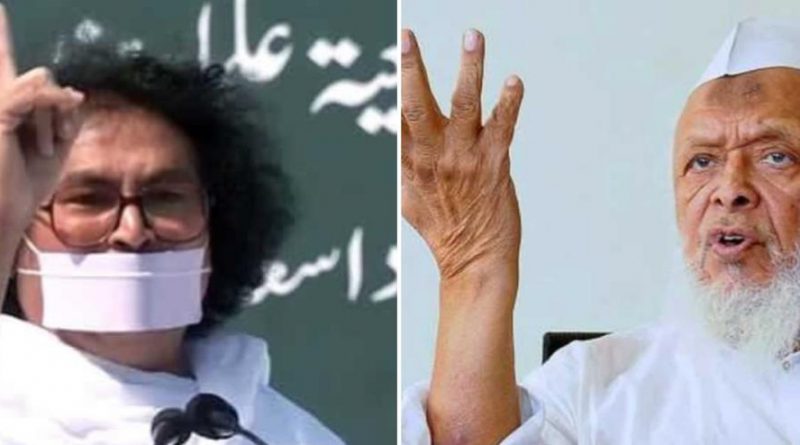OPINION: What Inter-faith dialogue should be like?
by Arshia Malik
Oneness of Allah and Om is nothing more than desperate attempts by an obsolete ulema whose knowledge can’t stand up to the scrutiny of the medieval texts.
There has been a row over the statements issued by the Jamiat Ulama-Hind (JUH) President Maulana Arshad Madani in its 34th general session at the Ramlila Maidan in Delhi. Jamiat Ulama-Hind (JUH) is a prominent Muslim organisation in India that was established in 1919 by a group of Sunni Muslim scholars and claim to have played an active part in the Indian freedom struggle.
They also claim to have opposed the partition of India. With branches in 22 states and working for various social and educational causes, it is currently led by Maulana Arshad Madani, scholar and current Principal of Darul Uloom Deoband. Deoband which is known is an Islamic seminary established in 1866 by Indian subcontinental Muslim theologians after the failure of the 1857 War of Independence against the British Crown.
The session could have been a genuine event for building bridges across India’s myriad religious sects and creating inter-faith dialogue. Instead, it wrought more contention and resentment in the already existing charged atmosphere of the country with statements and counter statements, mostly obfuscation of facts and obscurantist rhetoric.
There are some facts which need to be revisited to understand the context of the mischief Madani’s statements suggest. There is no question about which came first – Hinduism is the earliest of the major religions on the planet. It has no founding figure or central institution, but it coheres around a collection of ideas and texts. These texts stretch far back in human history: the most ancient, the Vedas, was already put into final form by 1200 BCE.
They were brought together under the name Hinduism when British scholars in the 19th century turned their attention to the religions of the subcontinent – the word Hindu, a reference to the mighty Indus River as it is in the name India. In a post-Enlightenment classifying mood, they drew borders around concepts that had always flowed rather freely.
Now the Hindus are telling their own story – a defence which is fair and called for and this is what is prompting these subterfuge statements and revisionist interpretations from monotheist priests and scholars. The Vedas are a collection of four ancient Hindu scriptures that are considered the oldest and most authoritative texts of Hinduism. The four Vedas are:
- Rigveda: The oldest and most important of the Vedas, it is a collection of over a thousand hymns dedicated to various gods and goddesses.
- Yajurveda: A collection of prayers and rituals used by priests during Vedic sacrifices.
- Samaveda: A collection of melodies and chants used in Vedic rituals, believed to be derived from the Rigveda.
- Atharvaveda: A collection of hymns, incantations, and spells used for both religious and secular purposes.
The Vedas have been preserved over the centuries through oral tradition and are still considered sacred scriptures by millions of Hindus around the world. They are studied and interpreted by scholars and practitioners of Hinduism to this day and continue to play a significant role in the religious and cultural life of India and other parts of the world. Some of the key ideas found in the Vedas include:
- Hindu gods and goddesses: The Vedas describe many different gods and goddesses worshipped in Hinduism, including Indra, Agni, Varuna, and Surya. Each deity has specific attributes and is associated with various rituals and sacrifices.
- Karma: The idea of karma, or the law of cause and effect, is an important concept in Hinduism. The Vedas describe how one’s actions can have positive or negative consequences in this life or in future lives.
- Dharma: Dharma refers to the principles of ethical and moral behaviour that guide human conduct. The Vedas describe how living in accordance with dharma can lead to a happy and fulfilling life.
- Reincarnation: The Vedas describe the idea of reincarnation, or the belief that the soul is reborn in different bodies after death. This concept is closely tied to the idea of karma.
- Moksha: Moksha refers to liberation or enlightenment, which is seen as the goal of human life. The Vedas describe various paths to achieving moksha, including meditation, devotion, and service.
- Rituals and sacrifices: The Vedas describe various rituals and sacrifices that are performed to honour the gods and ensure good fortune in this life and in the afterlife. These include fire sacrifices, chanting of hymns, and the offering of food and other gifts.
Now Islam rose in the 7th century, with its founder seeing the beginning of the expansion of the religion he inaugurated before his death in 632 CE. The Quran is often referred to as the “first book of the Arabs” because it was the first literary work in Arabic that achieved a high level of literary excellence and became widely recognized as a literary masterpiece. Prior to the revelation of the Quran, the Arabic language did not have a standardized form of writing, and the literary works that existed were mainly in the form of poetry or inscriptions. The Quran introduced a new form of literary expression in Arabic, and its unique style and eloquence set a standard for Arabic literature that has influenced literary expression in the language ever since.
The Quran is the central religious text of Islam and contains a wealth of ideas related to Islamic faith, spirituality, and ethical behaviour. Some of the key ideas found in the Quran include:
- Tawhid: The oneness of God is a central concept in Islam, and the Quran stresses the importance of recognizing God’s unity and submitting to His will.
- Prophethood: The Quran affirms the belief in prophethood, recognizing many prophets from earlier scriptures, and emphasizing Muhammad as the final prophet.
- Justice: The Quran emphasizes the importance of justice, fairness, and ethical behaviour. It calls upon Muslims to treat others with kindness, respect, and compassion, and to work towards social justice.
- Charity: The Quran encourages Muslims to be charitable, both in terms of giving to those in need and treating others with generosity and kindness.
- Accountability: The Quran emphasizes the idea of accountability, stressing the importance of taking responsibility for one’s actions and the ultimate judgment of God.
- Paradise and Hell: The Quran describes the concepts of Paradise and Hell as rewards and punishments for good or bad deeds in this life.
- Resurrection: The Quran describes the idea of resurrection and life after death and emphasizes the importance of preparing for the afterlife.
The process of compiling the Quran began during the lifetime of the Prophet Muhammad and was completed shortly after his death. The companions of the Prophet Muhammad who were involved in the compilation of the Quran were primarily those who had memorized the Quran in its entirety and had also recorded its verses in writing. These individuals were known as the hafiz, and they were responsible for ensuring the accuracy and authenticity of the Quranic text. After the death of the Prophet Muhammad, a committee of his companions, led by Abu Bakr (the first caliph of Islam), was formed to compile the Quran into a single, standardized text. This involved collecting and verifying the written records of the Quranic verses that were scattered throughout the community, and collating them into a single, uniform text.
The process of compilation was completed during the time of the third caliph, Uthman, who oversaw the production of several copies of the compiled text, which were then distributed to different parts of the Islamic world. The text of the Quran that we have today is essentially the same as the text that was compiled during the time of the Prophet Muhammad and his companions. However, there have been some allegations that the Quran plagiarizes or copies from Jewish sources. Some scholars and critics have pointed out similarities between stories in the Quran and Jewish texts, from Jewish scripture and tradition, such as the Torah and the Talmud, such as the story of Joseph and Potiphar’s wife or the story of the golden calf.
Muslims consider these stories to be part of their own religious heritage and believe that they were revealed to the Prophet Muhammad by Allah. Some argue that the similarities between the two traditions are due to shared cultural and religious heritage. It is worth noting that the Quran does not claim to be entirely original or independent of earlier scriptures. Rather, it presents itself as a continuation and final revelation of the same message that was given to earlier prophets, including Abraham, Moses, and Jesus.
To then go and make revisionist statements about the equivalence of Hinduism and Islam, the oneness of Allah and Om is nothing more than desperate attempts by an obsolete ulema whose knowledge can’t stand up to the scrutiny of the medieval texts and the Hindus reclaiming their religion from Middle Eastern and Western monotheistic imperialism. At best, an interfaith dialogue aimed at critical examination of religious scriptures to build a common understanding of faith and chart a future course for a nation with 250 million Muslims residing amidst the majority Hindus and minorities of other faiths too should have been the agenda of the three-day session at Ramlila Maidan, Delhi.
Arshia Malik is a Delhi-based writer, blogger and social commentator with focus on women issues and conflicts in societies with a particular focus on South Asia. She makes her living as a school teacher and is an avid collector of literature. Her fields of interests are education, minority and child rights, secularism and tolerant attitude in a fast developing world.
Disclaimer: Views expressed by writers in this section are their own and do not reflect Milli Chronicle’s point-of-view.



